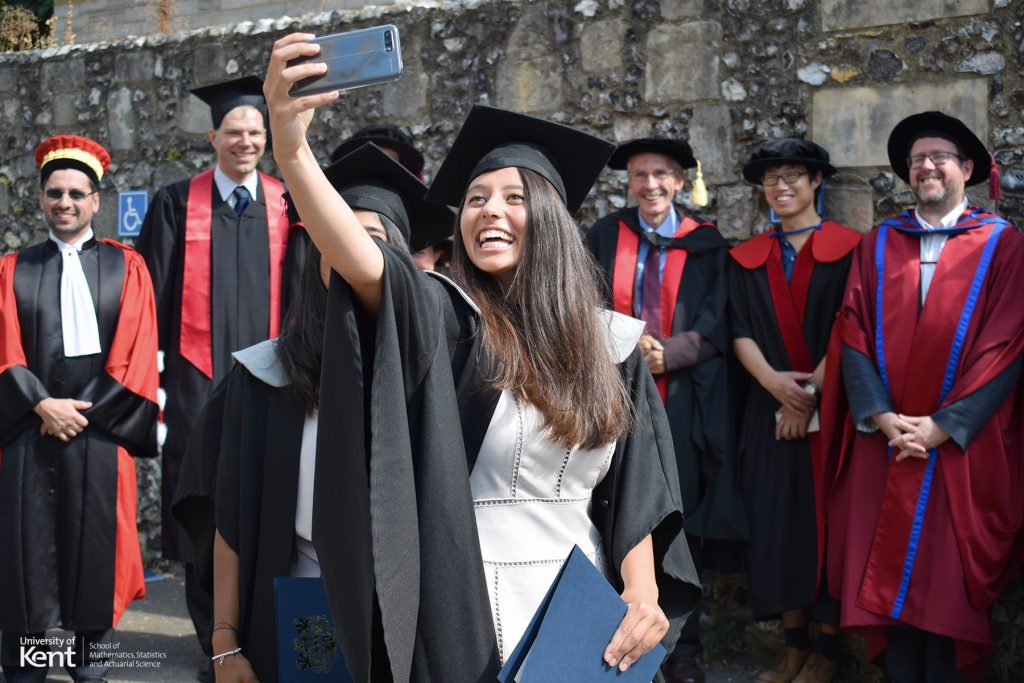Clarissa shares her experiences studying BSc Mathematics at the University of Kent, Canterbury.
What attracted you to Kent?
Since I first visited Kent, I’ve loved the campus and the city of Canterbury. They had a community feel and seemed like an environment that would be enjoyable to study in.
I took Kent’s International Foundation Programme. Originally, I planned to study architecture but soon realised it wasn’t for me so asked to switch to maths. It was a big decision and a huge commitment because to get on to the maths degree I had to take six A level examinations in 4 months. I’m so glad I did it though; it was definitely worth it.
How did you feel when you joined the School of Mathematics, Statistics and Actuarial Science?
The School is very welcoming and there’s lots of support available if you need it. It’s a good environment to learn in. It’s not competitive; we all want to do well ourselves but we want everyone else to do well too. Having been a student rep for the last three years, I know that the School listens to and acts upon student feedback.
Tell us about your Mathematics degree.
I enjoyed my first year. Most of the modules were mandatory because you need a solid base of mathematical knowledge, which you then build on as you progress through your degree. In your second and final years, you can choose modules in the areas you are interested in. For me, that meant applied mathematics.
Why applied mathematics?
I like being able to see how I can apply maths to real life. In one module, we looked at the behaviour of species populations, and were able to see if a particular species was facing extinction by studying some simple mathematical equations. It was amazing.
I was also able to take modules that were more rooted in financial mathematics, such as time series modelling and simulation, and stochastic processes. The School recently extended the range of options available to pure maths students, which is a great way to explore additional areas that we are interested in and get a taste of how we can use maths in future careers.
What about the teaching?
We are taught mainly via lectures and example classes. Each lecturer has a different approach to teaching so we receive a variety of learning methods. We also have computer-based classes with a lecturer on hand to help if we need them. In the first year, we had group tutorials where around six students would meet with our academic adviser to go over questions together. The small group meant the teacher could see if anyone had a problem. I found these really useful.
What about the lecturers?
I love them; they are super friendly and caring about their students! They are always willing to help even outside their office hours. We definitely appreciate their efforts especially during exam revision.
And your fellow students?
People are very friendly and exam revision has helped us to bond and work on questions together. This year I figured out how differently people approach the same mathematical problem. Throughout my studies, I have only met one other person who thinks in a similar way to me. It’s fascinating. I would never have thought that would be the case.
What do you think of the facilities?
The School is in the Sibson building and the maths facilities are fantastic. We often work together so in our social area we have white boards so that we can share our work. Sometimes our lecturers write a question on the boards in the morning and then see who answers it!
We can also use the Bloomberg Terminal and have the chance to complete the Bloomberg Market Concepts (BMC) course for free. It’s a good thing to put on your CV, particularly if you are looking to work in Finance.
Have you used the Careers and Employability Service?
Yes. They checked my CV and covering letters and gave me really good advice on how to write my personal statement for my Master’s application.
What are your future plans?
I am going to do a Master’s at Imperial College in London. After that I’m not sure. All my internships have been in finance so I will probably look to start a career in that area. I’m excited about my Master’s but I’ll be really sad to leave Kent; it became my second home.
What advice would you give to someone thinking of coming to Kent to study maths?
I would say if you don’t understand something ask your lecturers straightaway. Maths is cumulative, so you need to make sure you’re on top of it as you go along. Also, get involved in School life. I loved being a course rep, you get an insight into how your School works and you get to know your lecturers better.

